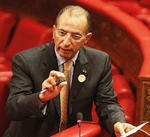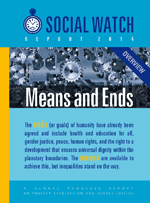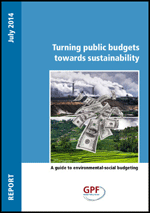Social Watch News
|
Published on Fri, 2014-08-01 09:50
|
Published on Mon, 2014-07-28 14:05
Following the groundless statements of the Minister of the Interior in front of the representatives of the legislative power against associations and human rights movement on 15 July 2014, and on the basis of his conspicuous tendency to lead invalid accusations against Moroccan associations and organizations working in the field of human rights and democratic development, in an attempt to disparage its efforts in advancing and protecting human rights.
|
Published on Thu, 2014-07-24 09:31
A set of 17 sustainable development goals has been adopted after over one and a half years of discussions and negotiations.
The Open Working Group (OWG) on Sustainable Development Goals (SDGs) concluded its 13th session (14-19 July) at the United Nations headquarters in New York following long drawn negotiations that stretched through the night of 18 July, finally leading to the adoption of the final document on Saturday afternoon of 19 July.
|
Published on Thu, 2014-07-24 09:16
While the International Movement ATD Fourth World welcomes the latest set of sustainable development goals adopted by the United Nations Open Working Group, the goals could better emphasize reaching the most marginalized.
With regards to poverty, “While the title of Goal 1, ‘End Poverty in all its forms everywhere,’ is ambitious,” said Isabelle Pypaert Perrin, director general of ATD Fourth World, “target 1.2 - to reduce by at least half the proportion of men women and children of all ages living in poverty according to national definitions - falls short. With no clear reference to prioritising those living in the greatest poverty, it could lead governments to target only those easiest to reach. This would contradict the principle of leave no one behind.”
|
|
Source: 
. Published on Sun, 2014-07-20 12:21
|
Published on Sat, 2014-07-19 15:39

Launching of the SW Report 2014.
|
The Social Watch Report on “Means and Ends” was launched last July 10 at the UN headquarters in NY during a side-event of the Development Cooperation Forum. The event allowed to present some key findings of the report and addressed strategic issues of the current development cooperation debate, such as the “leveraging” of ODA and it's redefinition, corporate access to ODA funds and the global financial architecture.
Introducing the debate, Barbara Adams from Social Watch and the Global Policy Forum, said that current conversations about “partnerships” are changing the landscape of development cooperation into one of multiple non transparent and unaccountable loose associations with corporations as main actors.
|
Published on Fri, 2014-07-18 12:21
The old debate around ends and means usually deals with unacceptable procedures claiming legitimacy because of the intended results. Not any more. In the current international debate around development goals for the United Nations, the “ends” are set so low that no major effort is really required from anybody. “No means are needed if the goals are meaningless” commented report editor-in-chief Roberto Bissio at its launch.
The Social Watch Report 2014, launched on July 9th in New York during the ministerial meeting of the High Level Political Forum of the UN, is a summary review of fifty country reports and an analysis of global trends by civil society organizations. The report, titled “Ends and Means” and it monitors how government and international institutions are doing in implementing their solemn commitments to eradicate poverty, achieve gender justice and promote sustainable development.
|
Published on Fri, 2014-07-18 11:05
Global Policy Forum publishes guide to environmental-social budgeting. International development policy is at a crossroads. By September 2015, governments plan to adopt a Post-2015 Development Agenda – an agenda that is supposed to shape the fundamental priorities, goals and strategies for development policy beyond 2015. In parallel, governments have agreed to develop a set of Sustainable Development Goals integrating all dimensions (social, economic and environmental) of sustainable development and being applicable to all countries in the world. Forming one coherent Post-2015 Agenda, including the SDGs, affects all policy areas beyond development policy in a narrow sense, in particular social, economic and environmental policy – and above all fiscal policy.
|
Published on Fri, 2014-07-18 10:59
The Palestinian NGOs Network "PNGO" addresses Mr John Gatt-Rutter, EU Representative to Palestine, while Israeli occupation offensive against the Palestinian people continue and in the light of the occupation's aerial, naval and artillery bombardment of the Palestinian houses and civil society organizations in the Gaza Strip, that left more than two hundred martyrs most of whom are children, women and elders and displaced hundreds of families leaving them with a shelter after destroying their houses, as well as destroyed agricultural lands, fishing boats, factories, and civil society organizations.
|
Published on Fri, 2014-07-18 09:44
Many voices have recently alerted to the impacts of the rulings by the US courts on Argentina’s ongoing dispute with a small minority of its creditors. Far from staying confined to Argentina, the decisions will have negative consequences on global financial stability have warned the International Monetary Fund, countries such as France, Mexico, Brazil and the US State Department, as well as economic analysts and civil society organizations.
In a recent statement human rights organizations are now calling on governments to consider the worldwide human rights impacts of this decision.
|
SUSCRIBE TO OUR NEWSLETTER
Submit

|











